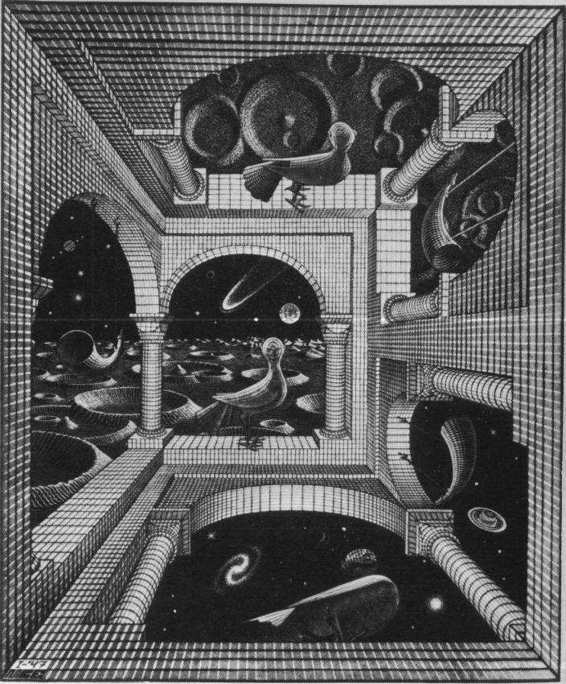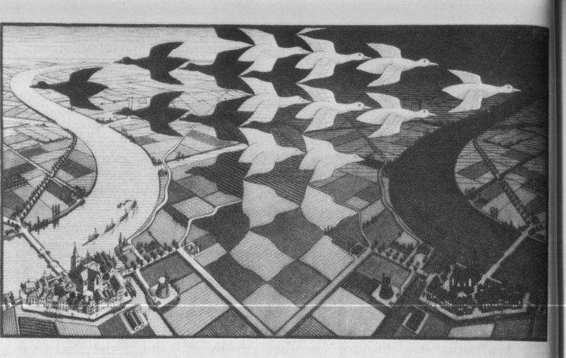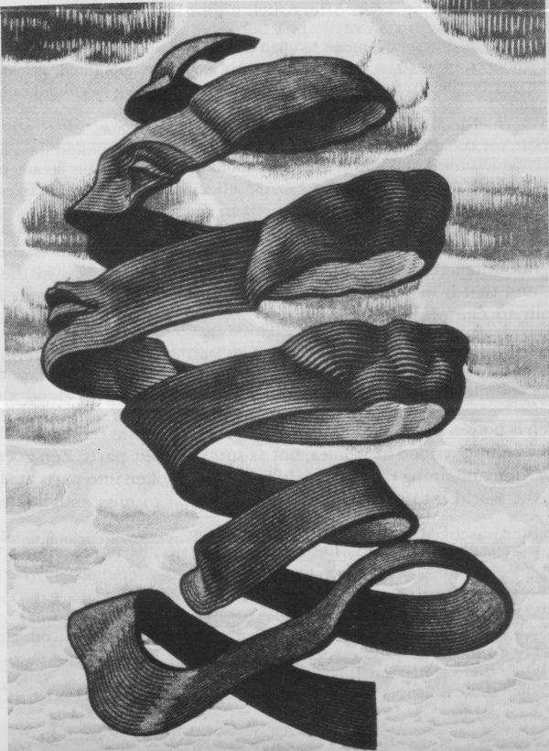Gödel, Escher, Bach: An Eternal Golden Braid (53 page)
Read Gödel, Escher, Bach: An Eternal Golden Braid Online
Authors: Douglas R. Hofstadter
Tags: #Computers, #Art, #Classical, #Symmetry, #Bach; Johann Sebastian, #Individual Artists, #Science, #Science & Technology, #Philosophy, #General, #Metamathematics, #Intelligence (AI) & Semantics, #G'odel; Kurt, #Music, #Logic, #Biography & Autobiography, #Mathematics, #Genres & Styles, #Artificial Intelligence, #Escher; M. C

FIGURE 47. Dewdrop, by M. C. Escher (mezzotint, 1948).
Mumon's Commentary:
Old Nansen gave away his treasure-words. He must have been greatly upset Mumon's Poem:
Nansen was too kind and lost his treasure.
Truly, words have no power.
Even though the mountain becomes the sea,
Words cannot open another's mind.
In this poem Mumon seems to be saying something very central to Zen, not making idiotic statements. Curiously, however, the poem is referential, and thus it is a comment not only on Nansen’s words, but on its own ineffectiveness. This type of paradox is quite characteristic of Zen. It is an attempt to "break the mind of logic". You see this paradox quality in the koan, as well. Concerning Mumon's commentary, do think that Nansen was really so sure of his answer? Or did the "correctness of his answer matter at all? Or does correctness play any role in Zen? is the difference between correctness and truth, or is there any? What if Nansen had said, "No, there is not any such teaching"? Would it have r any difference? Would his remark have been immortalized in a koan?

FIGURE 48. Another World, by M. C. Escher (wood-engraving, 1947).
Here is another koan which aims to break the mind of logic:'
The student Doko came to a Zen master, and said: "I am seeking the truth. In what state of mind should I train myself, so as to find it?"
Said the master, "There is no mind, so you cannot put it in any state. There is no truth, so you cannot train yourself for it."
"If there is no mind to train, and no truth_ to find, why do you have these monks gather before you every day to study- Zen and train themselves for this study?"
"But I haven't an inch of room here," said the master, "so how could the monks gather? I have no tongue, so how could I call them together or teach them?"
"Oh, how can you lie like this?" asked Doko.
"But if I have no tongue to talk to others, how can I lie to you?" asked the master.
Then Doko said sadly, "I cannot follow you. I cannot understand you
"I cannot understand myself," said the master.
If any koan serves to bewilder, this one does. And most likely, can bewilderment is its precise purpose, for when one is in a bewildered s one's mind does begin to operate nonlogically, to some extent. Only by stepping outside of logic, so the theory goes, can one make the lea enlightenment. But what is so bad about logic? Why does it prevent the to enlightenment?
Zen's Struggle Against Dualism
To answer that, one needs to understand something about what enlightenment is. Perhaps the most concise summary of enlightenment w be: transcending dualism. Now what is dualism? Dualism is the conceptual division of the world into categories. Is it possible to transcend this natural tendency? By prefixing the word "division" by the word
"conceptual", I may have made it seem that this is an intellectual or cons effort, and perhaps thereby given the impression that dualism could overcome simply by suppressing thought (as if to suppress thinking act were simple!). But the breaking of the world into categories takes plat below the upper strata of thought; in fact, dualism is just as a perceptual division of the world into categories as it is a conceptual division In other words, human perception is by nature a dualistic phenomenon which makes the quest for enlightenment an uphill struggle, to say the least.
At the core of dualism, according to Zen, are words just plain w The use of words is inherently dualistic, since each word represents, obviously, a conceptual category.
Therefore, a major part of Zen is the against reliance on words. To combat the use of words, one of the devices is the koan, where words are so deeply abused that one's mi practically left reeling, if one takes the koans seriously. Therefore perhaps wrong to say that the enemy of enlightenment is logic; rather dualistic, verbal thinking. In fact, it is even more basic than that: perception. As soon as you perceive an object, you draw a line between it and the rest of the world; you divide the world, artificially, into parts you thereby miss the Way.
Here is a koan which demonstrates the struggle against words:
Koan:
Shuzan held out his short staff and said: "If you call this a short staff, you oppose its reality. If you do not call it a short staff, you ignore the fact. N, what do you wish to call this?"

FIGURE 49. Day and Night, by M. C. Escher (woodcut, 1938).
Mumon's Commentary:
If you call this a short staff, you oppose its reality. If you do not call it a short staff, you ignore the fact. It cannot be expressed with words and it cannot be expressed without words. Now say quickly what it is.
Mumon's Poem:
.
Holding out the short staff,
He gave an order of life or death.
Positive and negative interwoven,
Even Buddhas and patriarchs cannot escape this attack.
("Patriarchs" refers to six venerated founders of Zen Buddhism, of whom Bodhidharma is the first, and Eno is the sixth.)
Why is calling it a short staff opposing its reality? Probably because such a categorization gives the appearance of capturing reality, whereas the surface has not even been scratched by such a statement. It could be compared to saying "5 is a prime number". There is so much more-an infinity of facts-that has been omitted. On the other hand, not to call it a staff is, indeed, to ignore that particular fact, minuscule as it may be.
Thus words lead to some truth-some falsehood, perhaps, as well-but certainly not to all truth. Relying on words to lead you to the truth is like relying on an incomplete formal system to lead you to the truth. A formal system will give you some truths, but as we shall soon see, a formal system-no matter how powerful-cannot lead to all truths. The dilemma of mathematicians is: what else is there to rely on, but formal systems? And the dilemma of

Zen people is, what else is there to rely on, but words? Mumon states t dilemma very clearly: "It cannot be expressed with words and it cannot
expressed without words."
Here is Nansen, once again:'
Joshu asked the teacher Nansen, "What is the true Way?"
Nansen answered, "Everyday way is the true Way.' Joshu asked, "Can I study it?"
Nansen answered, "The more you study, the further from the Way." Joshu asked, "If I don't study it, how can I know it?"
Nansen answered, "The Way does not belong to things seen: nor to thing: unseen. It does not belong to things known: nor to things unknown. Do not seek it, study it, or name it. To find yourself on it, open yourself wide as the sky." [See Fig. 50.]
FIGURE 50. Rind, by M. C. Escher (wood-engraving, 1955).
This curious statement seems to abound with paradox. It is a little reminiscent of this surefire cure for hiccups: "Run around the house three times without thinking of the word `wolf'." Zen is a philosophy which seems to have embraced the notion that the road to ultimate truth, like the only surefire cure for hiccups, may bristle with paradoxes.
Ism, The Un-Mode, and Unmon
If words are bad, and thinking is bad, what is good? Of course, to ask this is already horribly dualistic, but we are making no pretense of being faithful to Zen in discussing Zen-so we can try to answer the question seriously. I have a name for what Zen strives for: ism. Ism is an antiphilosophy, a way of being without thinking. The masters of ism are rocks, trees, clams; but it is the fate of higher animal species to have to strive for ism, without ever being able to attain it fully. Still, one is occasionally granted glimpses of ism. Perhaps the following koan offers such a glimpse :7
Hyakujo wished to send a monk to open a new monastery. He told his pupils that whoever answered a question most ably would be appointed. Placing a water vase on the ground, he asked: "Who can say what this is without calling its name?"
The chief monk said: "No one can call it a wooden shoe."
Isan, the cooking monk, tipped over the vase with his foot and went out. Hyakujo smiled and said: "The chief monk loses." And Isan became the master of the new monastery.
To suppress perception, to suppress logical, verbal, dualistic thinking-this is the essence of Zen, the essence of ism. This is the Unmode-not Intelligent, not Mechanical, just "Un".
Joshu was in the Unmode, and that is why his 'MU' unasks the question. The Un-mode came naturally to Zen Master Unmon:8
One day Unmon said to his disciples, "This staff of mine has transformed itself into a dragon and has swallowed up the universe! Oh, where are the rivers and mountains and the great earth?"
Zen is holism, carried to its logical extreme. If holism claims that things can only be understood as wholes, not as sums of their parts, Zen goes one further, in maintaining that the world cannot be broken into parts at all. To divide the world into parts is to be deluded, and to miss enlightenment.
A master was asked the question, "What is the Way?" by a curious monk. "
It is right before your eyes," said the master. "Why do I not see it for myself?"
"Because you are thinking of yourself."
"What about you: do you see it?"
"So long as you see double, saying Ì don't', and `you do', and so on, your eyes are clouded," said the master.
"When there is neither 'I' nor 'You', can one see it?"
"When there is neither Ì' nor `You', who is the one that wants to see it?"9
Apparently the master wants to get across the idea that an enlighte state is one where the borderlines between the self and the rest of universe are dissolved. This would truly be the end of dualism, for a says, there is no system left which has any desire for perception. But what is that state, if not death? How can a live human being dissolve the borderlines between himself and the outside world?
Zen and Tumbolia
The Zen monk Bassui wrote a letter to one of his disciples who was about to die, and in it he said: "Your end which is endless is as a snowflake dissolving in the pure air." The snowflake, which was once very much a discernible subsystem of the universe, now dissolves into the larger system which 4 held it. Though it is no longer present as a distinct subsystem, its essence somehow still present, and will remain so. It floats in Tumbolia, along hiccups that are not being hiccupped and characters in stories that are being read . . . That is how I understand Bassui's message.
Zen recognizes its own limitations, just as mathematicians have lea: to recognize the limitations of the axiomatic method as a method attaining truth. This does not mean that Zen has an answer to what beyond Zen any more than mathematicians have a clear understanding the forms of valid reasoning which lie outside of formalization. One o1
